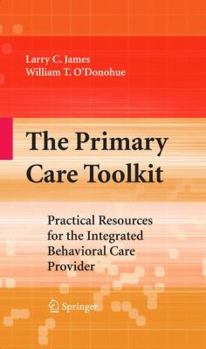The Primary Care Toolkit: Practical Resources for the Integrated Behavioral Care Provider
Select Format
Select Condition 
Book Overview
Integrated care is receiving a lot of attention from clinicians, administrators, policy makers, and researchers. Given the current healthcare crises in the United States, where costs, quality, and access to care are of particular concern, many are looking for new and better ways of delivering behavioral health services. Integrating behavioral health into primary care medical settings has been shown to: (1) produce healthier patients; (2) produce medical savings; (3) produce higher patient satisfaction; (4) leverage the primary care physician's time so that they can be more productive; and (5) increase physician satisfaction. For these reasons this is an emerging paradigm with a lot of interest and momentum. For example, the President's New Freedom Commission on Mental Health has recently endorsed redesigning the mental health system so that much of this is integrated into primary care medicine.





